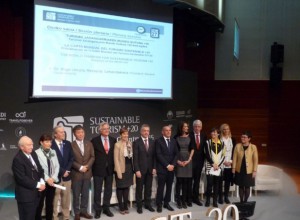.. SUSTAINABLE DEVELOPMENT ..
An article from Biosphere Tourism
The World Summit on Sustainable Tourism held in Vitoria on 26 and 27 November 2015 was the scene of the unanimous adoption and proclamation by His Excellency Don Iñigo Urkullu, President of the Basque Government, of the World Charter for Sustainable Tourism +20. This document, which is the reformulation of the First World Charter for Sustainable Tourism, incorporates the 17 Sustainable Development Goals adopted at the United Nations Summit on Sustainable Development held in September 2015, and represents a great opportunity to firmly steer tourism towards an inclusive and sustainable way.

The World Summit on Sustainable Tourism held in Vitoria on 26 and 27 November 2015 was the scene of the unanimous adoption and proclamation by His Excellency Don Iñigo Urkullu, President of the Basque Government, of the World Charter for Sustainable Tourism +20. This document, which is the reformulation of the First World Charter for Sustainable Tourism, incorporates the 17 Sustainable Development Goals adopted at the United Nations Summit on Sustainable Development held in September 2015, and represents a great opportunity to firmly steer tourism towards an inclusive and sustainable way.
The Charter also claims the preservation of the actual quality of the destinations and the tourism industry and the ability to meet the tourist as priorities, as well as the need to promote alternative forms of tourism. Finally, it urges the authorities and related associations to this activity, to promote activities that contribute to the implementation of the principles and recommendations outlined in the World Charter for Sustainable Tourism and convene where appropriate a new meeting in order to assess achievements and establish renewed alliances.
The resolution will be presented to the UNESCO Director General, the Secretary General of the UNWTO and the Executive Director of UNEP, in order to receive support for its wide circulation among the major players of world tourism in order to guide the action of tourism in the framework of the 17 Sustainable Development Goals adopted at the United Nations Summit on Sustainable Development.
.
How can tourism promote a culture of peace?
Comment by Liliana Mota, October 23, 2013
Why tourism?
Can tourism be seen as an instrument to achieve complicity between people’s minds?
“There is nothing better that connects two people’s mind than a good conversation” The above quote could be used to describe the effect which tourism has on people. Like a great conversation, tourism could be said to play a vital role amongst people all over the world. It fosters communication in all its senses, intercultural dialogue and mutual understanding.
In today’s world it is evident that there is a shortage of moral or ethical values amongst people across the different nations in this world, resulting in a globalised world lacking these morals and ethical values. Ignorance, the failure to consider the needs of others, and selfishness are a few of the ways which hinder us from embracing diversity and a common human perspective, which would result informal empathy, internal moral compassion, tolerance of differences, historical consciousness and interpretation. The above mentioned features are intrinsic, inherent and can be found in the practice of tourism.
Tourism has been emphasized as one of the most effective instruments which continue to tackle to tackle social and economical poverty, as well as encourage the culture of peace practice amongst people. In looking at the UN architecture, one is able to see the growing implications which the tourism sector has on the world and world policies. The touristic phenomenon has achieved a world record of 5% of world’s GDP contribution and is responsible for 235 millions jobs, according to the UNWTO’s data. Often the tourism sector counts more than 20% of the countries’ GDP.
On the negative side of this, it is evident that tourism focuses on economical matters, depriving any focus on the global implications of the constant interaction tourism encourages.
In the literal sense, tourism is nothing more or less than people meeting with the willingness to understand each other’s differences and point of view and simultaneously creating the opportunity for dialogue, mutual understanding and peace to take place.
Apart from tourism, various factors could be seen to play a role in encouraging integration and diversity amongst societies across the world. For example, the cultural segment has played an essential source of people’s integration and inclusiveness in developing countries.
Education has also played a significant role in encouraging integration, and incorporation amongst people all over the world. Education has been reconsidered and proposed to being the catalyst for exchange between countries, cultures and sectors, and most importantly for enhancing the lives of people by granting them the opportunity to leave their poverty stricken lives and societies in exchange a for better future which includes job and exchange opportunities.
In the tourism world, differences play the most essential role, differences among people represents the added-value. Being different is always a positive factor that usually motivates and encourages people to get to move and engage with each other and embrace the differences with the use of spiritual, religious and cultural meanings.
This notion of tourism needs to be addressed in multilateral governance discussions, where all the main actors, the international community, the ministerial and experts, private sector, local institutions and civil society engages are all present, and are all willing to work together in combined efforts and initiatives (from poverty alleviation to the promotion of awareness of sustainable development addressing special needs like regional development, urban planning and protection of natural and cultural landscapes). This combined approach of working at the local level within communities and at the national and international level, in order to reach and engage the poor, has been considered as potentially being the “one possible and effective answer” and effective approach towards the world’s poorest areas where it can make a difference.